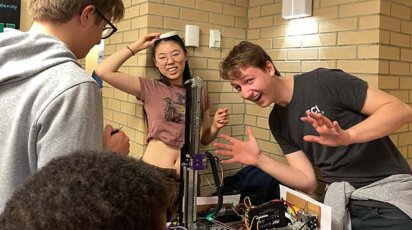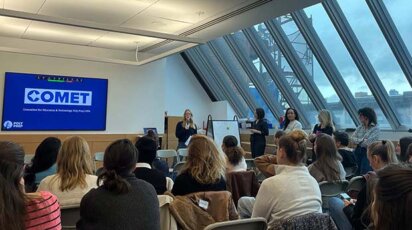News
Virtual Festival of Lights Shines Brightly
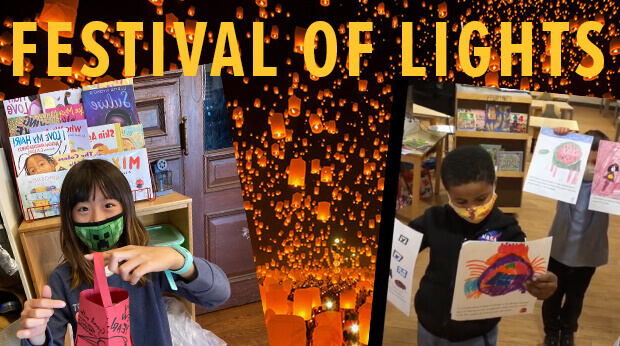
A pandemic could not dim the lights on a longstanding Lower School December tradition. Our celebration of the Festival of Lights was held on December 11 virtually at community time.
Normally, Grade 4 hosts the event, which was begun by former teacher Pat Morris, and a lunch for younger students and faculty. Children read aloud about the celebrations of Kwanzaa, Ramadan, Diwali, Yalda, Christmas, Hanukkah, Lunar New Year, and Winter Solstice as teachers light candles.
This year, Assistant Head of Lower School Alison Flannery P’31, ’33 began with a discussion of the important part light plays in the “cultures and religions around the world” who celebrate these holidays.
Diwali
Flannery explained that Kindergarten had studied the celebration of Diwali, which began on November 14. Diwali is a major festival observed by Hindus, Jains, and Sikhs and celebrates the victory of light over darkness, good over evil, and knowledge over ignorance. A short video illustrated the children working on their Diwali projects in class.
Yalda
First Grade studied Yalda, a Persian festival, which is celebrated on December 21, the longest night of the year. In a short video, students read brief reports about who celebrates Yalda, including the people of Iran. Families decorate their homes with candles and share food, music, and poetry. “Happy Yalda!” the class proclaimed.
Winter Solstice
The Winter Solstice will occur on December 21. Nursery studied Winter Solstice and learned a poem that they recited in a video:
“Twinkle, twinkle little light, Making winter’s Darkness bright, Light a candle, spread good cheer, Winter Solstice now is here!”
Hanukkah & Christmas
Two more celebrations feature light in very important ways. The Jewish celebration of Hanukkah began on December 10 and lasts for eight nights until December 18 with the lighting of a candle each night. Advent candles and lights on trees are important parts of the Christian celebration of Christmas on December 25.
Kwanzaa
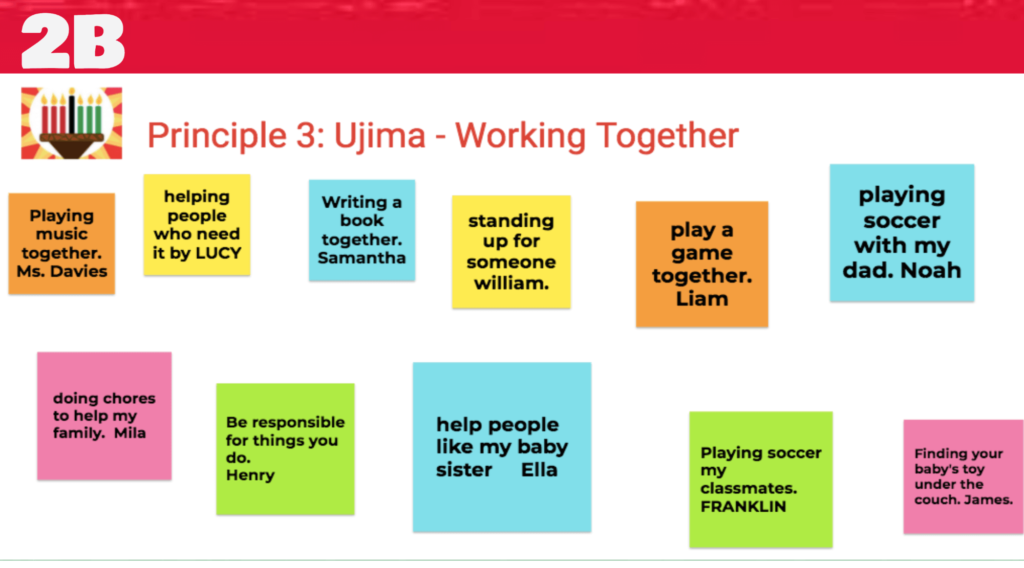
Second grade classes studied the seven principles of Kwanzaa, the celebration of African American culture, which goes from December 26 to January 1. They shared their reflections on post-it notes. Grade 2A studied the principle of Kujichagulia (Self-determination). “Don’t give up!” wrote Sophia. Jude said, “Be yourself.” And Christian R. wrote, “Believe in yourself.” Grade 2A also studied Umja (Unity) and Chris said “Always get together and work together to build something together.” Grade 2B studied the principle of Ujamaa (Supporting One Another). “Give homeless people food,” wrote Noah. “Standing up for someone,” wrote Franklin. Grade 2B also studied the principle of Ujima (Working together). “Doing chores to help my family,” Mila reflected on her post-it.
Grade 2C studied the principle of Nia (Setting personal goals) and one student advised, “Donate some of your old books and toys to people who need it more than you.” Grade 2C also reflected on Kuumba (Creativity). For one child that meant, “Finding a new way to include others in a game and help them understand it.” The 2SVO class studied the principle of Imani (Faith), believing in yourself and others. “It means supporting one another no matter what,” wrote Asya. And for Gabriel, Imani means, “Being nice.”
As a special video treat, Lower School music teacher Jennifer Nelson P’12, ’14, ’19 and her children, Hans Bilger ’12, Ruby Bilger ’14, and Evangeline Bilger ’19, sang about “The Principles of Kwanzaa.”
Lunar New Year
Lunar New Year will be celebrated on February 12, 2021. In short videos students reported what they had learned about Lunar New Year. One student said, “Lunar New Year is the festival of lights that scares off all the bad luck from the past year and brings in good luck.” In Taiwan, he said, the celebrants eat dumplings, oranges, and whole chickens that must be finished for good luck. People travel to visit their families and children receive red envelopes, reported another student. They play mahjong, she said, and make red lanterns that they release into the sky.
Students also reported on Lunar New Year celebrations in Korea and Grade 3 shared photos of the red paper lanterns they made in class.
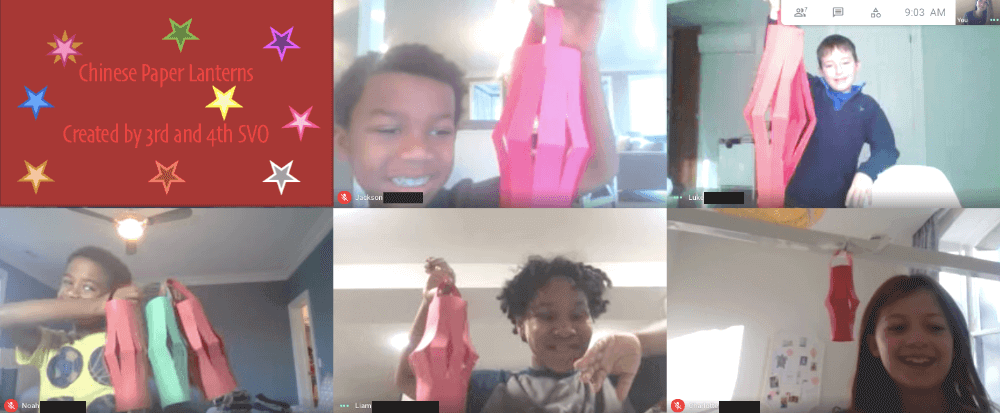
In one video, 4B presented a report on Lunar New Year including a discussion of the animals of the Zodiac calendar and the origins of the traditional lion and dragon dances. In a lively video, 4B, led by Ms. Nelson, played Lunar New Year music representative of China.
Ramadan & Eid al-Fitr
Yet to come are the holidays of Ramadan and Eid al-Fitr, April 12 – May 11. In a video, Pre-K shared what they had learned about Ramadan, such as “You have to pray five times,” “Ramadan is fasting,” and “Ramadan is helping people.”

